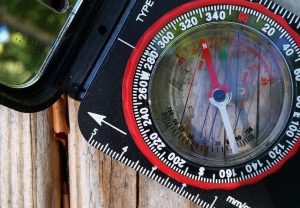During one of the trips to Washington D.C. that my father took, he made some rubbings of names that are on the Vietnam Veterans Memorial Wall. In the moment he was telling me this, I recall not being overly impressed. What was he going to do with them? Later in his office in a frame, the names hung on his wall. These were the names of men who served with my father who didn’t make it back to their families. He wanted to not only to remember them, but also honor them in this personal way for their service and sacrifice. A lot of my knowledge of honor comes from what my father taught me about it – about showing respect to those that have given up something of themselves for a greater cause. While some would argue that the cause of the Vietnam War was not great, but no matter your views on the conflict, many men and women died on both sides. Each side has its way of honoring its fighters in the conflict. While I don’t know what monuments the Vietnamese erected to honor their soldiers, we in the United States have built many across our country.
Its funny the things we remember. I do recall the controversy the Vietnam Veterans Memorial Wall design stirred up. Many people wanted a more traditional memorial with statues of soldiers, but instead its a wall of the names of the fallen or missing on dark highly polished stone. By having each person’s name carved into the stone, each person is honored and those who wish can do rubbings like my father did. Many of those who died in the Vietnam War were drafted and didn’t want to be there, others were career military like my father, and some were volunteers like the over 250,000 women who joined the conflict. Most likely many didn’t have the same conviction to join the fight as say those of the WWII generation who joined the war to end the evil of fascism.
The rubbings my father made have been in the back of my mind as the controversy swirled around the Confederacy statues. The fact that it is a controversy is mind boggling. Its estimated that 61,000,000 people died in the Second World War, a war to stamp out fascism, but now in my country we see the rise of fascist bigotry. This bigotry has been here for centuries, but in the last two years it has come out of its cave in force.
Many of the bigots have cried that the statues of Confederate generals coming down are a stab at honoring Southern culture. No, it is not. Those statues being erected in the first place are a slap in the face of the Lady of Liberty. Our monuments should honor those who fought for the constitution, to protect American people, and/or ideals of our country (minus the mess that got us into the Vietnam War). It is one thing for a society to remember its heroes who have fought for the ideals of a society and another to build monuments to traitors. Countries don’t erect monuments to honor their enemies. Why should we? The statues of Confederate generals and soldiers are statues of traitors. These are men who fought against the ideals of the Union. They should not be honored on our monuments in our public spaces. They should be remembered in our museums as traitors, so future generations can learn from their mistakes, which some people of the current generations haven’t.
This brings us to the currant cultural war that we are having. This conflict has been going on for a long time. The latest battles have turned violent and even deadly. In Charlottesville, Va., a man drove a car into anti-fascist demonstrators killing a 32 year old woman, Heather Heyer. She was a fighter for ideals that Americans hold dear, a country free of bigotry for all to be prosperous in. A modern soldier in a conflict that keeps dragging on. She was a paralegal at a local law firm who wanted to send a clear message to neo-Nazis that they were not welcome. She was a small town girl from Greene County, Virginia who wanted people to go and meet a Muslim if they didn’t know one. She was also a Bernie follower. Via social media, she repeatedly called out police malpractice and being against racism. She was a passionate civil rights activist. She was loved, cherished, and respected by her family, friends, and co-workers. She wasn’t afraid to be on the front line and raise her voice against hatred. While she may not have been wearing a uniform, she was cut from the same cloth as many anti-fascist fighters who came before her. She is a American hero. As part of her legacy, her family has started the Heather Heyer Foundation to provide financial aid scholarships to people interested in social change.
I doubt we will erect a statue to honor her, but if we do make a monument to my country’s current civil war, her name needs to be on it. Unfortunately, I expect her name will be one of many.


